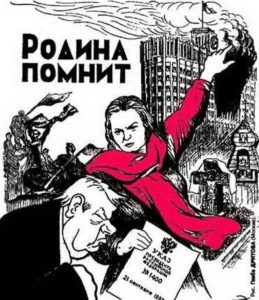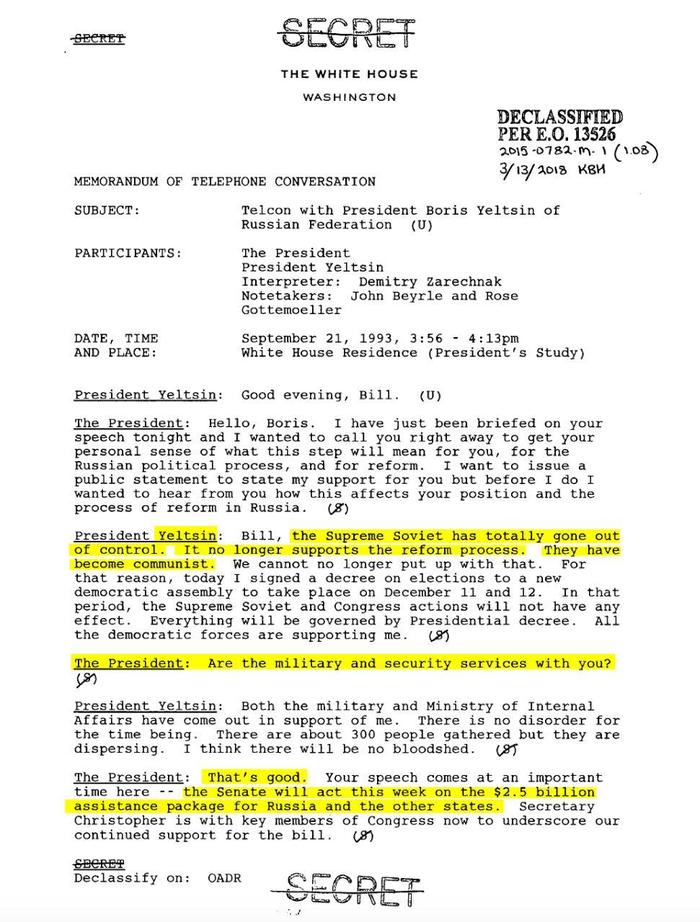On this day, exactly 30 years ago, Yeltsin, with the direct blessing from the USA, gave order for the tanks to open fire on the Parliament building in Moscow, that also was known as “The White House”. This ended the confrontation between the defenders of the Russian Constitution and Yeltsin, who was unconstitutionally concentrating more power in own hands, a confrontation that started with
30 years is a long enough stretch to time to be able to look at the events of that Autumn with a critical eye, yet short enough for many of the contemporaries and direct participants of the evens to be around to remember what was happening on both sides of the barricades. In a few weeks I will finish translating a documentary that does just that. But first, a short look at the political spread in 1993 both internally and coming from the USA. And this publication will be concluded with a fragment of the last interview with one of the main participants of the stand-off, who defended the Parliament – Ruslan Hasbulatov, who passed away on the 3rd of January 2023.
In the previous post, Autumn of 1991 as a Prelude to the “Black October” of 1993 and the “Wild ’90s” in Russia, I described in short the turmoil of the Autumn of 1991. Back then Yeltsin played a major role in the breakup of the USSR, and it was he who, in a feat of projection, accused the SCSE – which tried to save the country – of being the coup-makers. At that time Yeltsin became an important asset in the US State Department’s arsenal, one that the USA would have been loath to lose. In 1993 Yeltsin had the complete backing of the USA, but his ability to give external control to Russia was severely limited by the Parliament. This lead to passing of the unconstitutional Decree 1400. At the same time the experience of 1991 was again used, with the Parliament being presented as coup makers, and not as defenders, in the public view. The liberal crowd began an assault on the Constitution, basically saying who needs a Constitution like this (meaning, where Yeltsin cannot do anything he wants).
The Constitution that was in effect in the Russian Federation in 1993 was still the one inherited from the RSFSR and dated back to 1978. In it, the final say in the running of the Republic was in the hands of the Supreme Council. With Yeltsin gaining more and more power, Russia was entering a state with a competing duality of power, a situation that had to be resolved one way or another.
It must be said that there is nothing wrong with either a presidential republic or a parliamentary republic – both modes of governance have their upsides and downsides, both can be abused if unscrupulous people take the helm, and both can lead a country to prosperity if the parliamentarians or the president have the wellbeing of a country as their first priority. However, in the case of Russia anno 1991-1993, there was a strong outside actor interfering in the domestic events – the USA. By 1993 Yeltsin had already proved to the overseas “benefactors” that he is more than willing to had over all the keys from Russia for some dubious praise and a sizeable monetary bonus. Thus Russia had to become a presidential republic for the USA to retain the control, especially since the parliamentarians were growing more and more weary of Yeltsin’s reforms that were turning into an outright looting of the country and its population. To get a feel on what Yeltsin’s reforms brought upon Russia before and after the coup of 1993, I would highly recommend reading Alex Krainer’s book The Killing of William Browder: Deconstructing Bill Browder’s Dangerous Deception. Suffice to mention the “Shock Terapy” by Gaidar, and his reply to a question about 36 people dying of famine in Zelenograd, that it is natural that people who cannot adapt to the reforms – die. At that time, Russia was losing approximately 2.2 million people per year. Chubais at the same time is quoted saying that “30-40 million people who would not adapt to the reforms, will go extinct”. In short, it was as stated in the title of an article that I translated several years ago: Andrey Karaulov: For Russia the ’90s Were Worse Than WWII.
Enter Decree 1400 on the “gradual constitutional reform in the Russian Federation” which was dispersing the Parliament in its current composition. The decree was deemed unconstitutional by the Constitutional Court of the RF, and the Parliament started to prepare the procedure for the impeachment of Yeltsin. The conversations between Yeltsin and Clinton that were declassified in 2018 show how Yeltsin was reporting back and seeking support with the USA. Read the highlights of the following page:
President Yeltsin: Bill, the Supreme Soviet has totally gone out of control. It no longer supports the reform process. They have become communist. We cannot no longer put up with that. For that reason, today I signed a decree on elections to a new democratic assembly to take place on December 11 and 12. In that period, the Supreme Soviet and Congress actions will not have any effect. Everything will be governed by Presidential decree. All the democratic forces are supporting me.
The President: Are the military and security services with you?
President Yeltsin: Both the military and Ministry of Internal Affairs have come out in support of me. There is no disorder for the time being. There are about 300 people gathered but they are dispersing. I think there will be no bloodshed.
The President: That’s good. Your speech comes at an important time here — the Senate will act this week on the $2.5 billion assistance package for Russia and the other states. Secretary Christopher is with key members of the Congress now to underscore our continued support for the bill.
Just on the 10th of July 1993, Yeltsin had this to say about the Supreme Soviet: “On [the topic of] Ukraine, yesterday our Supreme Soviet said that Sevastopol is a Russian city. It is a peculiar situation. Sevastopol is on Ukrainian territory. It is a very odd decree. When I get back, I will have to work on relations with Ukraine. Thank God no one takes the Supreme Soviet seriously!” Yet, in just 2 months the Supreme Soviet – the Parliament – demanded to be be taken seriously, to the extent that Yeltsin had to order Army to shoot at own people, while he himself was on a stand-by to be evacuated to the American Embassy.
Yeltsin ignored the democratically elected representatives, ignored his former fellow fighters for democracy, like Ruslan Hasbulatov, who was one of the Gorbachev’s young reformers, who stood by Yeltsin in 1991, yet who could not remain silent in the face of the destruction that Russia was suffering. Ruslan Hasbulatov never returned to politics after the events of 1993, and only broke silence by giving an interview about that time in December of 2022, a month before his passing. Below is the obituary from “Vesti” with fragments of that interview.
Backup at Rumble.
The complete transcript of the video material above
Professor-economist of the prestigious Plehanov Academy of National Economy,
Ruslan Hasbulatov became one of the most recognizable figures
of Russian politics in the early 90s.
[Gennadij Zjuganov, Chairman of the CPRF]
Quite skilfully conducting the complex ensemble of the Supreme Council and the Congress,
he made his contribution, which, in fact,
largely saved some sectors, the economy,
and did not allow the country to continue falling apart.
Hasbulatov got into big politics in the 1990, when he was elected
a deputy of the Supreme Soviet of the USSR from the then Chechen-Ingush Autonomous SSR,
and in 1991 he became the chairman of the Supreme Soviet of the RSFSR.
At his post, he became the first non-nomenclature representative
and the first Chechen to occupy such a high post in the Soviet state.
The death of the brightest representative of the nation
is an irreparable loss for the entire Chechen people.
I express my sincere condolences to the relatives and friends of Ruslan Imranovich.
During the events of the SCSE (August 1991), Hasbulatov will become one of the main authors
of the call to the citizens of Russia, which Yeltsin would read from the tank.
And after the failure of the coup, he will speak for the implementation of the Belavezh agreements
that ended the history of the Soviet Union.
He will later recognize these actions as erroneous.
[Ramazan Abdulatipov, Special Representative of the RF at the Organisation for Islamic Cooperation]
Hasbulatov was a man of his epoch, of his time,
a man of his views, and he defended those views consistently and fiercely.
Over a comparatively short period of time, from being an ally,
he became one of the toughest opponents of President Yeltsin.
In his exclusive and last interview,
which Ruslan Imranovich gave to our colleague Nailya Askir-Zade two weeks ago,
he told in detail about those dramatic events.
[Ruslan Hasbulatov, Corresponding Member of the Russian Academy of Sciences, in 1991-1993 Chairman of the Supreme Council of the RSFSR]
We often had some quarrels and discontent,
but I didn’t see it as some kind of political struggle.
But when he categorically rejected any meetings and negotiations,
all the time saying that the Supreme Council and its chairmen had disrupted some negotiations.
Okay, we are ready for any compromise, but you must cancel Decree 1400.
The decree on a gradual constitutional reform in the Russian Federation
became a trigger for the armed resolution of the prolonged crisis.
Hasbulatov tells that he tried to reach the Kremlin from the White House until the last minute.
– Is Boris Nikolayevich in the office? – Yes, he is.
– Connect me with him. – No, Grachev is with him.
Then also tell Grachev that I’m going to the Kremlin now.
Let Grachev stay behind there as well.
Okay, Ilyushin tells me, I’ll call you back.
And the connection was lost.
In an exclusive interview for our channel
Hasbulatov told previously unknown details about the dramatic hours in the White House.
I was sitting in my office – there were huge windows there, about 6 meters high – when all of a sudden
when with a crack and thunder, a window falls down, and a hole in the opposite side appears.
My guards immediately rushed to me saying, “Ruslan Imranovich, they will kill you.”
“Yes”, I said.
I didn’t really believe that I would get out of there alive.
After the arrest, Ruslan Hasbulatov spent several months in the Lefortovo prison,
and was released on amnesty.
I didn’t feel anything. You know, there was no relief.
Some kind of aloofness.
That is, all the romantic expectations that I shared –
I was such a champion of Gorbachev, as, by the way, most of the intellectuals –
all of that faded away.
In the end, there was hope, okay, they demolished the USSR,
let’s at least do something for the society, for the people in the Russian Federation.
Ruslan Imranovich never returned to politics.
He headed the Department of World Economics at the Plehanov Russian University of Economic.
He read lectures, wrote books, built a collection of smoking pipes.
The funeral of the politician will be held tomorrow in his native village, Tolstoy-Yurt.
Dmitry Kayestor, Nikolay Zaharov, Dina Fetisova, “Vesti”.



Pingback: Newspaper “Pravda” commemorating the 30th anniversary of the “Black October” of 1993 | Nemo's Realms